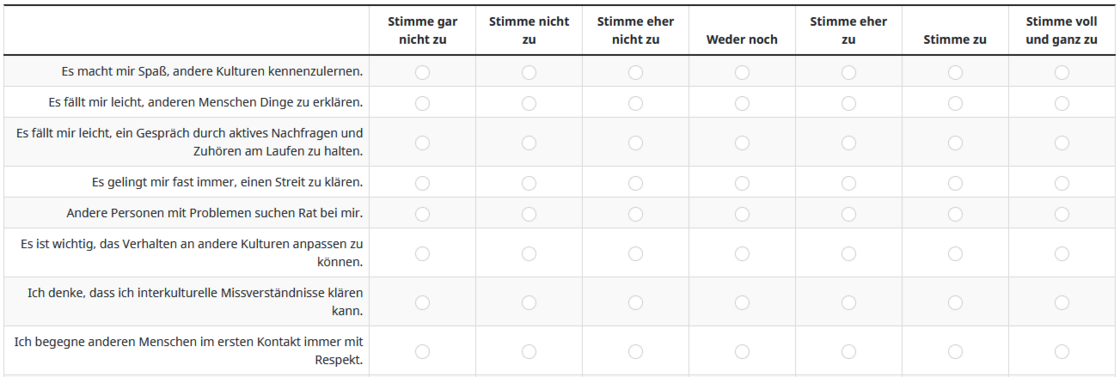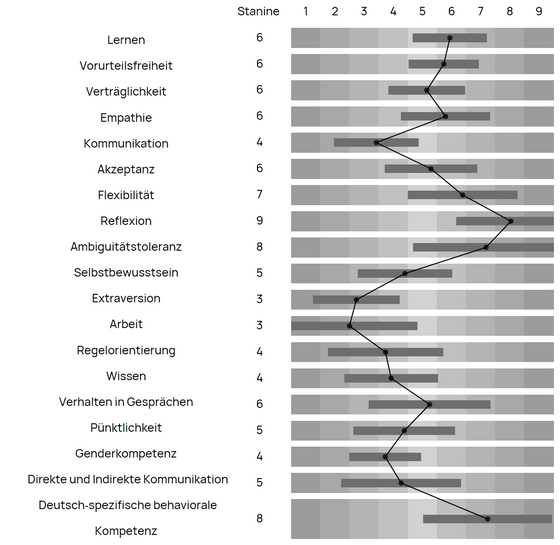Cult_Euro_1-Test for Intercultural Competences
Description of the Test
The Cult Euro 1 Test is a procedure for measuring General and German culture-specific intercultural competence. General intercultural competence comprises characteristics and skills for effective and appropriate behavior in interaction with members of any cultures. German culture-specific intercultural competence refers to characteristics and skills for effective and appropriate interactions with members of the German culture. The test is divided in a module for general intercultural competence and in a module for German culture-specific intercultural competence which can be applied independently from each other. The test is addressed to the HR recruitment and development in public and private organisations, Universities of Applied Sciences as well as to researchers on the topic intercultural competence and diversity. Furthermore, the test contributes to the HR development of internationally active organisations, Universities of Applied Sciences as well as institutions which are responsible for the training and further qualification of migrants in Germany, for instance, the Public Employment Office.
The Cult Euro 1 Test represents the first validated and standardized test for intercultural competence. The test enables thereby not only a measurement of the cross-cultural competence of the participants but records also culture-specific competence for the German culture. The test stands out as well as with the innovative distinction between cross-cultural and culture-specific competence and with the strong empirical support of the model and the measurement procedure. The validity and reliability of the Cult Euro 1 Test was checked with regards to the contents validity, construct validity, convergent validity, discriminant validity, face validity, statistical validity, structural validity and criterion validity. The analysis takes place in a time-saving manner with the help of an IRT-based software solution and offers comprehensive clarifications which ensure a high interpretation objectivity. In summary, the advantages of the Cult Euro 1 test are the following:
- The first standardized test for Intercultural Competence
- Innovative Model (General and Culture-Specific Competence) empirically validated
- High content validity, construct validity, convergent validity, discriminant validity, statistical validity, structural validity and criterion validity
- Mixed-method approach: consideration of relevant target groups during the test construction
- Critical incidents approach with high external validity and practicability for the Culture-Specific Intercultural Competence
- Parallel versions A/B to provide a better and surer application in the practice
The general intercultural competence comprises skills which are necessary for the interaction with all cultures (especially perspective change, cultural empathy, emotional competence). It describes according to this a generalisable competence which enables a quick and sustainable adaptation with interactions with foreign cultures. The test part can be filled in by anyone and contains in the standard version 73 self-report items on a seven-point Likert scale. The processing time takes approximately 7 minutes.
| Subdimension | Items | Sample Item |
| Cultural learning | 9 | I enjoy getting to know new cultures. |
| Freedom from prejudice | 10 | I feel stressed from foreign cultural rules. |
| Tolerance | 8 | I can communicate well with people from other cultures. |
| Communication | 6 | During conflicts I try to form my own opinion. |
| Empathy | 6 | I often am concerned how my counterpart perceives a situation. |
| Acceptance | 6 | I accept it when other cultures indulge in their traditions. |
| Flexibility | 7 | I love surprises. |
| Reflection | 7 | I find it ok to sometimes be uncertain. |
| Ambiguity tolerance | 7 | I do not like any unclear situations. |
| Self confidence | 4 | Others tell me that I appear self-confident. |
| Extraversion | 3 | I find it easy to carry small talk. |
The culture-specific competence scale measures abilities, which people from all possible cultures need in Germany to interact successfully (e.g. knowledge about norms, rule-orientation, structureness). People who are born in Germany find the processing of these questions most of the time very easy. As also the possession of a German passport at this point cannot be a helpful criterion, it is offered to use the test only for people who themselves or their parents have migrated to Germany, the so called Internationals. Culture-specific competence in Germany means does not mean here to behave like an average German person but rather describes the ability to be successful when dealing with Germans. The test part contains in the standard version 35 self-report items on a seven-point Likert scale as well as 16 Situational Judgment Test items for each of which the participants must choose the correct one out of three possible reactions. The processing time is approximately 13 minutes.
| Subdimension | Items | Sample Item |
| Work | 6 | I find it good when private and professional are strictly divided. |
|
|
|
|
| Rule-orientation | 5 | In Germany passengers should remain standing at the red traffic lights also when no car is coming. |
| Culture-specific knowledge | 5 | I do not understand the table manners in Germany. |
| Talk behavior | 6 | During an official greeting in Germany it is normal to offer one's hand. |
| Punctuality | 4 | I get on really well with German punctuality. |
| Gender-competence | 5 | Men are often more appropriate for leadership positions than women. |
| Direct/indirect communication | 4 | I find it difficult to understand hints by Germans. |
| German specific behavioral competence | 16 | You are on the way to an important appointment. You already know that you will arrive late. How would you behave? I decide to cancel the appointment as a delay is inacceptable. I try to inform the person concerned, e.g. on the phone. I come too late. The others will, for sure, have an understanding. |
Application of the Test
The general and the culture-specific part of test are built as independent modules and can be applied as a modular system for remote as well as presence testings single or in groups. The conducting of the test takes place over the survey platform LimeSurvey which enables a secure and fast processing of the data. Individual participants can access the survey over any terminal device in a browser application and can conduct the test.
To enable an individual reaction to your challenges and goals we offer both test modules in addition to the standard A- and B-Versions each in the following versions:
| Long version | Ideal for comprehensive tests for the preparation of stays abroad or development center | Approx. 30 minutes processing time |
| And B-Version | Standard version for the recruitment of employees, repeated testing with many equivalent test versions possible | Approx. 20 minutes processing time |
| Short version | Optimized version of the test for quick processing. Ideal for the testing of bigger personnel groups or research | Approx. 10 minutes processing time |
Your Results
The Cult Euro 1 Test offers the participants a differentiated analysis as well as an explanation about the meaning of the single values and how these values were achieved.
The test result can take values for each competence area stanine values of 1 to 9, the mean is five and the standard deviation is 2. A value of 5 means that approximately half of the people who filled in this test have achieved a higher value while the other half a lower value.
Additionally, the participants receive a visualisation of the test results which enables a fast interpretation. For companies, teams and departments we offer furthermore the possibility for accumulated group analysis which, for instance, can enter the organisational development.
Proofs of Validity
A special feature of the Cult Euro 1 Test is its scientific foundation. The test was developed and validated in a multistage process. Based on its comprehensive qualitative study (more than 250 students, employees and unemployed) were identified in a first step 19 dimensions of intercultural competence. With these dimensions were developed items with seven answer options each. Furthermore, in the qualitative interviews critical incidents were identified. These situations which are especially relevant, challenging or typical for interactions with members of the German culture were subsequently applied in Situational Judgment Tests.
After the item pool was complemented with a student sample after a pilot study, the validation and standardization of the test took place with a sample of 6294 participants. A special emphasis was placed on the checking of the content validity, the convergent and discriminant validity as well as criterion validity. The calibration of the items was conducted the help of a Generalized Partial Credit Model (GPCM, Muraki, 1997) so that the analysis was IRT-based and took place over a Bayesian estimator. Eventually the items were divided into an A- and B-Version and the comparability and reliability of the two versions of the test were checked.
April 2020: The project application based on the innovative model was approved in the VIP+ Program of the Federal Ministry for Education and Research.
Starting point: The development and validation of the Cult Euro 1 Test began.
April 2020 – April 2021: Qualitative study: A qualitative study with 250 participants (including people with and without a migration background) was conducted.
Used Methods: Half-structured interviews and qualitative content analysis identified key aspects and constructs for the test development.
April 2021 – April 2022: Prestudy: Development and first test of the questionnaire with 500 participants. Refinement process: focus groups and expert discussions refined the test.
April 2022: A prototype of the Cult Euro 1 was completed.
March 2023: A comprehensive validation study was completed. Conducted with more than 6000 participants which provided a solid data base for the test validation and calibration.
September 2023: Confirmation of the Test Model: The construct and the model based on the Classical Test Theory and the Item Response Theory were confirmed. Next Steps: Test standardization, development of analysis software and creation of the handbook of the test.
Juni 2024: Transparency certificate conferred. The Cult Euro 1 Test for intercultural competence received the Transparency Certificate of the Test Board. Recognition: confirms the high quality, transparency and reliability of the test for the academic and professional application.

